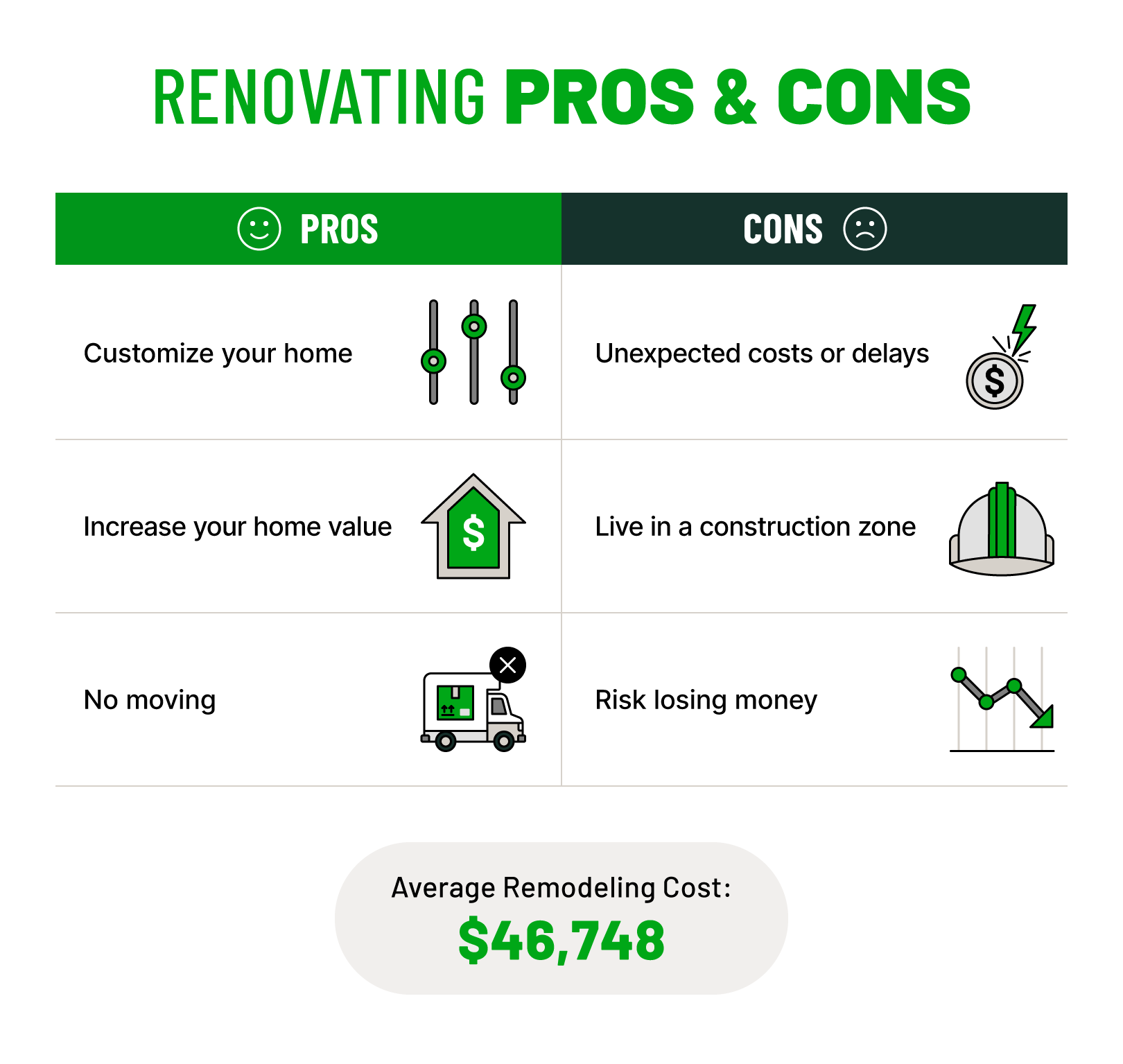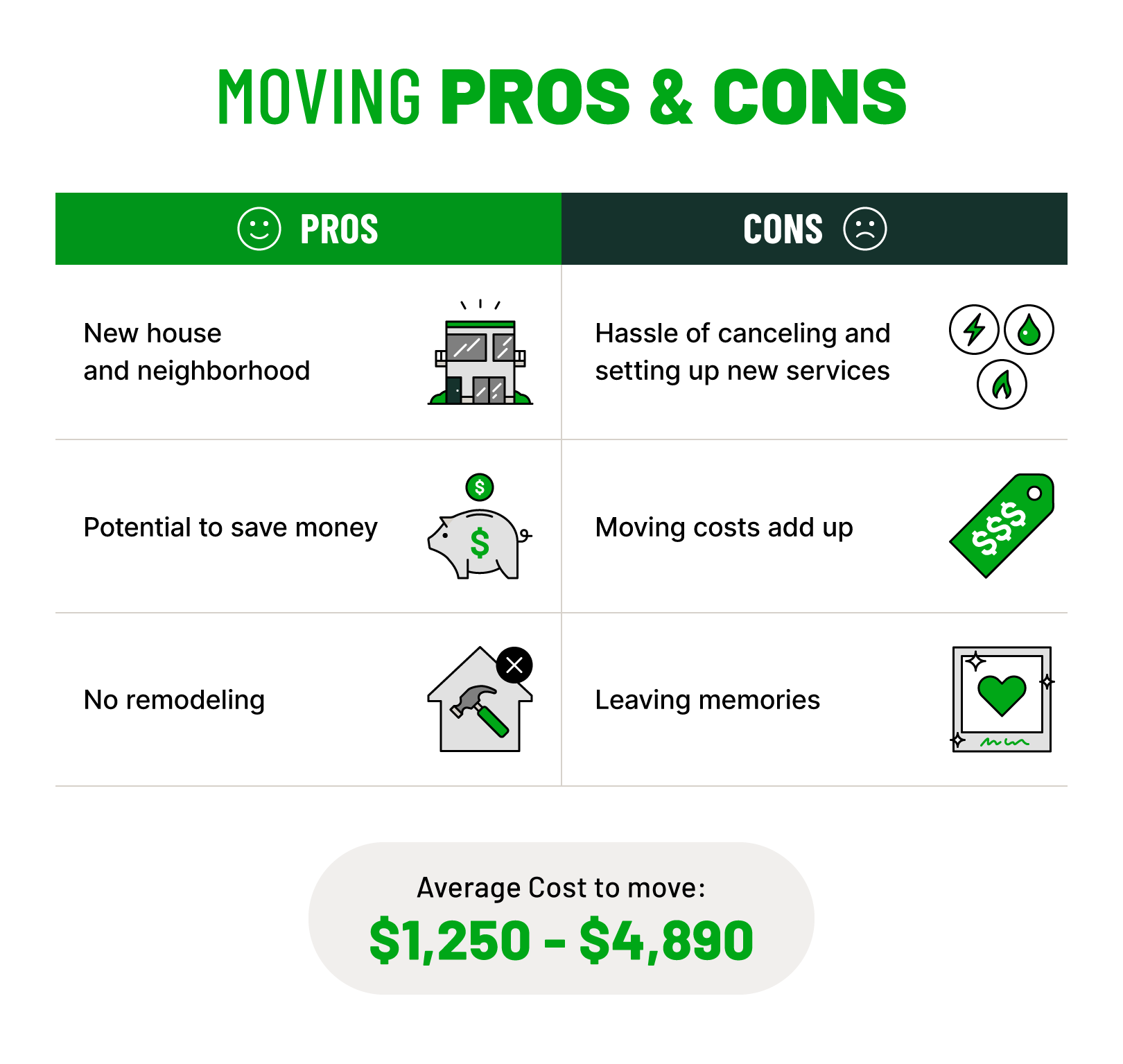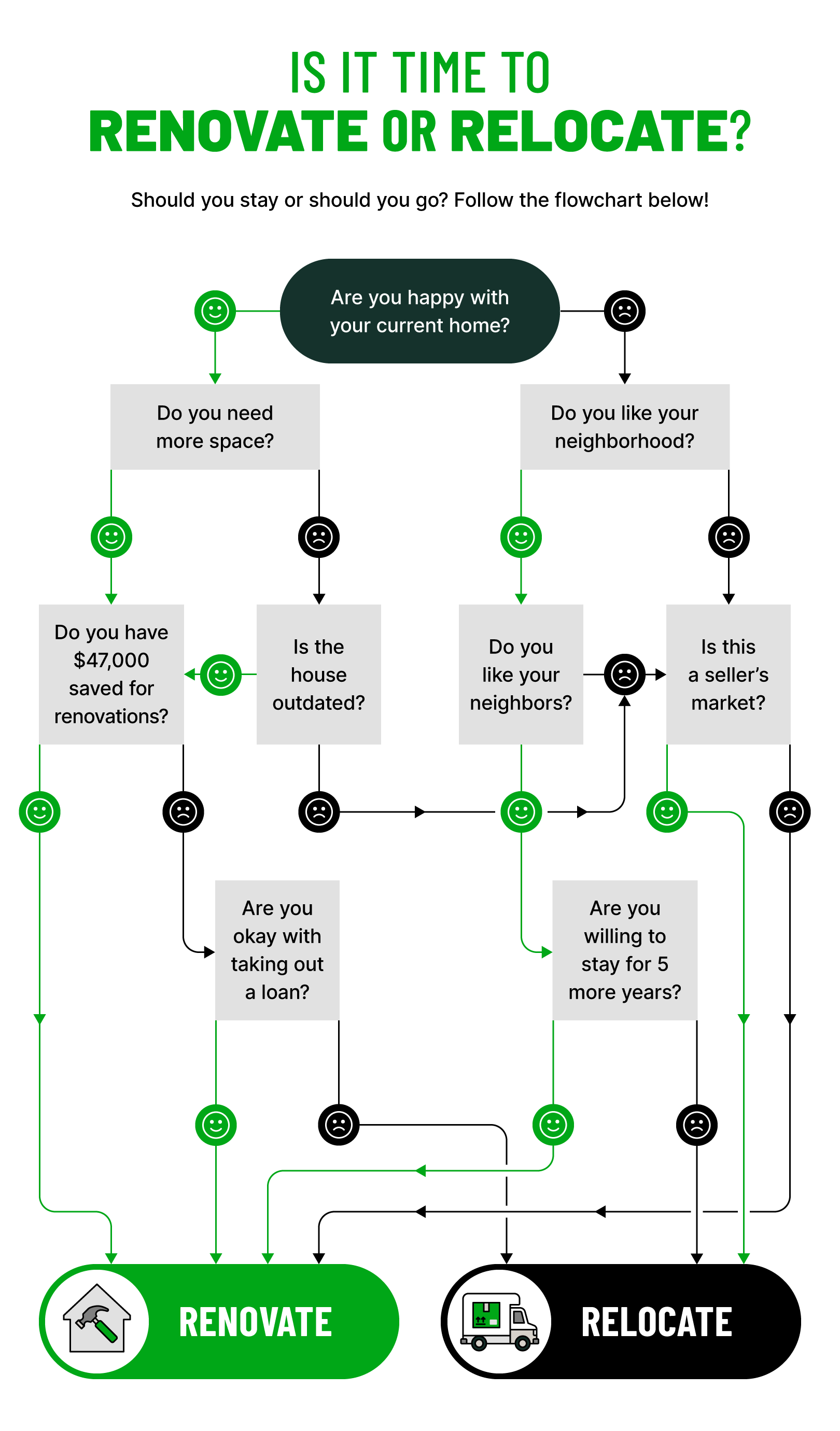As the housing market continues to be volatile, the decision to renovate or move is becoming more difficult than ever. Home prices are rising, mortgage rates are increasing to nearly 4%, and inventory is low — yet home sales have increased by 1% from 2021. Is now the time to sell your home and relocate, or should you stay put and give your home a much-needed facelift?
To help you make this life-changing decision easier, we’ve developed five questions to ask yourself that will provide more clarity as you weigh the pros and cons of renovating and moving.
Key takeaways:
- Our five questions will help you decide if you should renovate or move.
- Use our list of pros and cons for remodeling and moving to create your own lists.
- Both renovating and moving will incur costs, and our flowchart and guide can help you determine a ballpark figure.
1. Why am I considering a remodel or move?
There’s a reason you’re asking yourself, “Should I move or stay in my home?” Maybe you already know exactly why a change is needed, or maybe it’s just an elusive thought, a feeling, an itch you can’t scratch. Here are a few common questions to consider that can help you better understand if you’d like to remodel the home you have or move into a new place.
- Do I need more space? Your family may have grown since you originally bought your house, or maybe you just need a basement to turn into a movie theater.
- Is the entire house outdated or just certain rooms? Only a couple of rooms might be stuck in 1974 with wood-paneled walls, or maybe the entire house is like walking into an episode of “Family Ties.”
- Do I like my neighborhood/neighbors? The convenience of the grocery store two blocks away might not be worth the biweekly late-night parties at the house across the street.
- Do I like my yard/yard work? Not everyone likes mowing away their Saturdays.
The more factors you consider, the more clear the picture will become on whether you want to renovate or move.
2. How much does it cost to renovate vs. move?
The national average cost to renovate your house is around $47,000. However, this number is fluid and different for each individual homeowner. Both renovating and moving will incur costs, but what makes sense for you may be different than what makes sense for others. Consider these common questions when it comes to cost:
- What is my current mortgage situation?
- How much do I have saved in the bank?
- What is the scale of my renovation plan?
3. What is the temperature of the current real estate market?
Research the market to determine if now is a wise time to stick that “for sale” sign in your front yard. Look at homes comparable to yours that have recently sold in your area. This will give you an estimate of what you may get for your own home.
Will you get the maximum amount if you sell your home now, or should you wait until the market heats up again? Spring and summer are optimal seasons for selling your home where you tend to meet or exceed your asking price.
4. Is now the best time for you and your family to move?
Uprooting your family can be a big adjustment and feelings can be mixed from household to household. If you move to a new school district, your kids will have to change schools and make new friends, or you may have to pay tuition to keep them in their current district.
5. How much will you miss living in your current home if you move?
Moving can bring new energy into your living situation, while renovating your house can breathe new life into the place where you’ve created so many memories. Will you miss your current home if you move? Will the new house feel like home?

Before making any big decisions, it’s always a great idea to weigh the pros and cons. Use our suggestions below to help you make your own list to decide if you want to renovate or move.
Remodeling Pros
Use these common remodeling pros and cons to help figure out your next course of action.
You can create the house you always wanted
Do you want that open floor plan and the mid-century modern kitchen with fire-engine red appliances? When you remodel, you can customize each room to create the home you’ve always wanted.
You can increase your home value
Updating and upgrading your home will increase the value of your home for when it’s time to sell. Kitchens and bathrooms are the two rooms that add the most value to your home, so it’s wise to start with those rooms. Making these improvements does require costs upfront, but the renovations will pay for themselves in the long run.
You don’t have to move
The results of a recent study show that moving tops the list as the most stressful life event. Remodeling your home can save you time, money, and considerable stress by staying put and reimagining your space. Look at it this way: You could move into a house you simply like or you could renovate for a similar price and make your current dwelling an amazing new version of itself.
Remodeling Cons
Remodeling isn’t all fun, creativity, and building something fresh and new. There are plenty of stressors to plan for if you choose to go the remodeling route.
You might see unexpected costs or delays
No matter how many times you’ve asked your contractor, “How long does it take to renovate a house?” before they start, sometimes things happen that add unexpected costs and delays to the project. Imagine getting a call that your contractors removed some drywall and discovered costly water damage that you didn't know was there and now needs to be addressed. Something like this could set the project back weeks and add a lot of money to the final bill.
Your house will be a construction zone
Prepare yourself to live in a chaotic mess. During the remodeling process, your house will look less like a home and more like a construction zone. Depending on what rooms are being remodeled, inconveniences like sharing bedrooms, eating takeout, or living out of boxes may be part of your daily life until the project is completed.
You risk losing money
Sometimes the renovation doesn’t pay off as you hoped. A remodel is expected to increase your home value, but if the eventual sale of your home doesn’t net you the return you expected, it may not have been worth it in the long run.

Moving Pros
Moving could get you a new start in a new neighborhood in a new-to-you house you absolutely love. Check out these moving pros and you might find out the grass is greener.
You get something fresh and new
Sure, packing up and transplanting can be a lot of work, but moving into a new place can be exciting. You get to start from scratch in a different space and enjoy a fresh perspective on daily life. You can discover your new home’s quirks and find creative ways to decorate. As you explore a new neighborhood you may even make friends with neighbors on your street.
You don’t have to remodel
Planning a remodel and going through the construction process is stressful and can be quite expensive. When you buy a new house, you have the choice to pick out a product that is already finished that you can plug your family into. If you want a bigger kitchen, you can look for a house with the space you want without having to knock down a wall.
You could save money
To get what you want from your home remodel, you may need to make drastic changes. Moving can help you avoid making these changes that can add up and cost you more money than you're comfortable spending. For example, if your house is worth $250,000 and you put $50,000 into renovations, it's possible your property value could only increase by $10,000. But if you simply buy a new house for $250,000, you’re saving money and getting an already-finished product.
Moving Cons
Despite the thrill of watching your kids pick out their new bedrooms and greeting the Hendersons next door with an apple pie, there are some drawbacks of moving to consider.
You might have an emotional attachment to your old home
You’ve created a lot of memories in your home and you need to be sure you’re okay with moving away instead of renovating. Maybe it was the first home you and your spouse bought together. Maybe your child took their first steps in the dining room or you hosted Sunday dinner for your extended family each week. You’ll always have the memories, but be sure you’re okay with leaving the emotional attachment of those walls before you decide to move.
You have to pay expensive moving costs
The average cost of moving ranges between $1,250 (local) and $4,890 (long distance) — and that doesn’t even include the house. There are almost always costs that you forget to include in your move, and those you did add are usually expensive. Not only are you paying the price of the new home, but there are also lots of other expenses that add up. These can include:
- Hiring movers
- Home repairs
- Buying new items and furniture for your new space
If there is a gap or overlap between moving, you may have to pay double the mortgage or stay in a hotel until your new home is move-in ready.
You have to set up new services and memberships
Putting down roots in a new area means creating a checklist to cancel or move services from one address and set up new services in your new location. Enrolling in new services usually requires deposits as well. If you move out of state, you’ll need to cancel memberships to local places, like the gym, and set up new ones.

Is it better to remodel or move?
So, is it better to remodel or buy a new home? Because every homeowner’s situation is different, there isn’t a standard answer to this life-changing question. Use our five questions to help you get clarity on renovating vs. moving and create your own list of pros and cons to get yourself even closer to your decision.
Whichever option you choose, Hippo will be there with modern homeowners insurance to help you crush homeownership during your relocation or renovation.
This article is for informational purposes only and was compiled from sources not affiliated with Hippo. While we believe this information to be reliable, we do not guarantee its accuracy or completeness. The maintenance tips provided reflect general homeowner guidelines and are not professional advice. For any insurance-related decision, please consult your licensed insurance producer.

